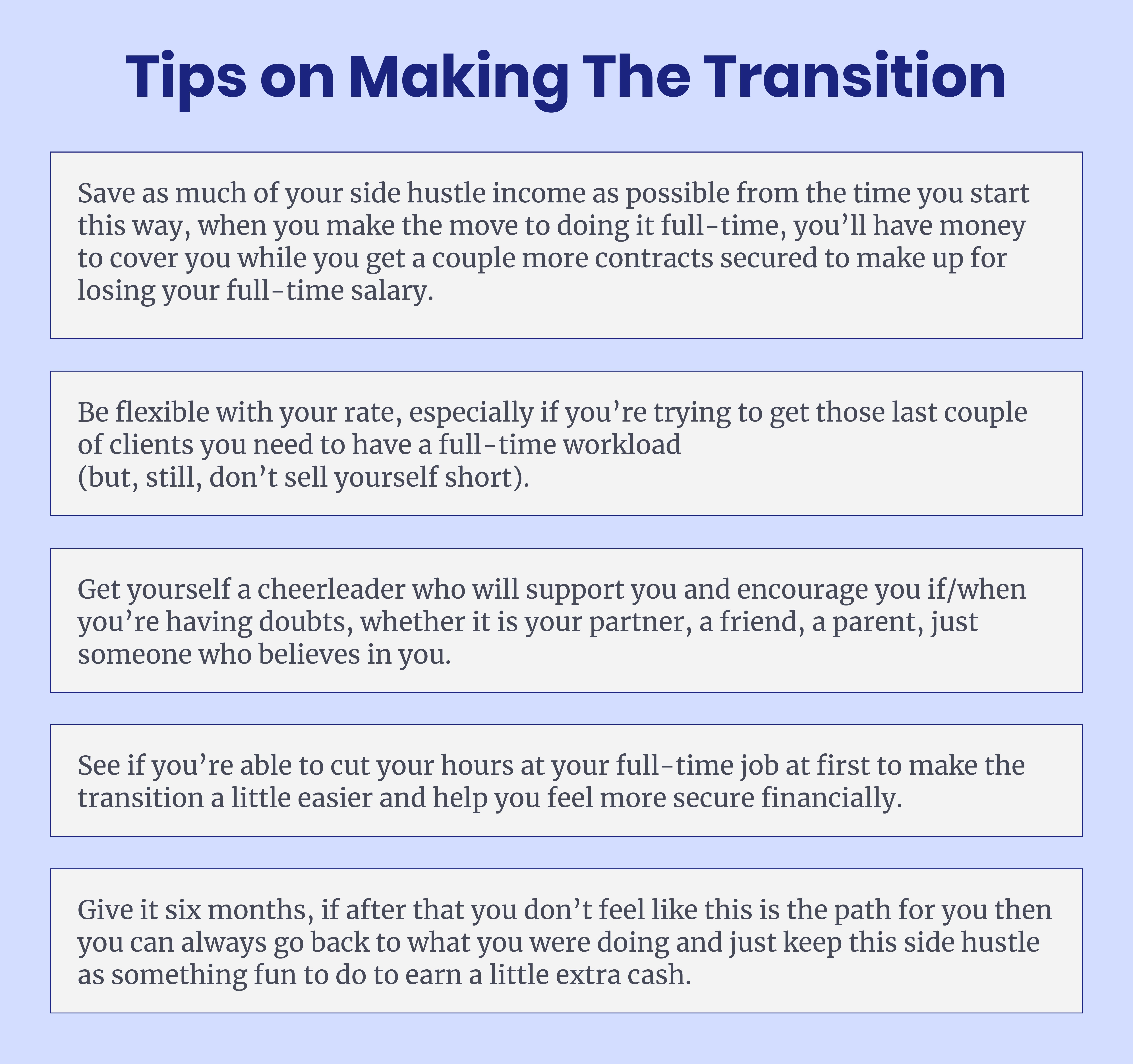The great thing about a side-gig is that, whatever it is, it’s probably something you have a genuine interest and satisfaction in doing. Even if at first it’s not bringing in a ton of extra money, the work itself is typically enjoyable so it tends to be worth it, and if you stick with it long enough, your income and workload will increase, and you could find yourself in a position where you can quit your 9-5 and focus solely on the side gig.
I have always enjoyed writing for pleasure. In college, I started blogging to keep my family updated on my life, and then when I moved from the midwest to the east coast after graduating college, I kept on going with it. As I got older, I had less to share but still loved to write, so I started ghostwriting blogs for different businesses as a side gig. Admittedly, I was making next to nothing for this work at the time, but it was less about the money and more about getting to create something since my full-time job was anything but creative.
Now, writing is my main source of income and I make an actual living from it. Every now and then, I still wonder how I managed to go from working in healthcare and recruiting to writing full-time in the world. This is partly because I can’t believe I am actually doing something I thoroughly enjoy, but also because it was a slow process to get here. I hesitated a lot before I made the leap from the corporate world to this because it wasn’t glaringly obvious to me that I could make the move and be successful.
Making a big career move when you’re an adult with a family dependent on your income is scary. What if you fail and end up having to go back to the industry you had left? How do you know when it’s time, and safe, to make the move?
Signs It May Be Time
As with all things in life, there will not be a sign that means guaranteed success because transitioning your career is a risk, no matter where or how you do it. So, the first sign is simply that you’re ready and willing to take that risk. Here are some other signs:
You’re charging a livable wage. Whether you’re charging by the hour or by project, take that amount and multiply it by if you were doing it full time or 40 hours a week. Is it enough for you to cover your expenses? Often, when you start a side gig, you’re starting from the bottom with little experience so you are working more to build your portfolio than to generate income. Eventually, though, you’ll be able to charge clients more to bring in market value for your work.
You have long-term clients or contracts. To make your side hustle your full-time job, you need to be sure you have enough ongoing work to sustain your salary. Do you have ongoing contracts with clients you’ve worked with for longer than six months? Or, do you have several projects lined up? Or, do you have several people cold calling you asking you to take on more work? If so, these are signs that your work is in demand.
You’re working more nights and weekends than not. Eventually, as your side hustle grows, you’ll find yourself putting more and more energy into it. It is great, but the problem is that if you still have your full-time job, then you’re looking at about 60+ hours a week, which is unsustainable. If you’re constantly working in one way or another, you have to scale back somewhere — ideally in your full-time job.
You are bringing in more than enough money. It’s especially true if, by turning your side hustle into your full-time gig, you’ll be working as a freelancer or contractor. Having ongoing clients is great, but the nature of the business is that they can end your contract without much warning, or your income could fluctuate if things on their end change. If you have enough clients wanting to work with you long-term that you’d be bringing in enough to cover expenses even if one dropped you, then it might be time to drop your full-time job.
For me, my biggest sign was being overworked. I would be working until 10 p.m. most nights throughout the week, during my girls’ naps on the weekends, and at least one weekend night. Between freelance work and my main gig, I was bringing in a lot of money, and for a while, the idea of dropping any income seemed foolish (we have two kids in daycare, so we need all the money we can get). However, burnout was inevitable at the rate I was going and I had to make a decision. Ultimately, I chose to take the risk to do what I enjoy.
Tips on Making The Transition
I am a Type-A planner and I hate unknowns. Needless to say, as much as I wanted to make this transition, it was hard for me. If you’re anything like me, you want a road map or a step-by-step guide to follow to ensure you are successful. Unfortunately, I can’t give you that, but here are some tips based on what worked for me:
- Save as much of your side hustle income as possible from the time you start this way, when you make the move to doing it full-time, you’ll have money to cover you while you get a couple more contracts secured to make up for losing your full-time salary.
- Be flexible with your rate, especially if you’re trying to get those last couple of clients you need to have a full-time workload (but, still, don’t sell yourself short).
- Get yourself a cheerleader who will support you and encourage you if/when you’re having doubts, whether it is your partner, a friend, a parent, just someone who believes in you.
- See if you’re able to cut your hours at your full-time job at first to make the transition a little easier and help you feel more secure financially.
- Give it six months, if after that you don’t feel like this is the path for you then you can always go back to what you were doing and just keep this side hustle as something fun to do to earn a little extra cash.

Make The Move
If this is something you’re really passionate about and that will bring you joy, don’t let the fear of failure stop you. If there is one thing I wish I could change about my experience it’s how long I doubted myself and my work. It’s easy to undermine yourself, but remember that if you’re finding success with this as your side hustle, then you’re good at what you do and there is a very high chance that you’ll find success with it as your main gig, too. So, when it feels right, take the risk.
Ashley Ziegler is a full-time writer with a passion for telling stories through the lens of motherhood to help fellow moms feel seen and understood (especially the ones who, like her, are totally winging it).
Support throughout your working motherhood journey
Get access to career opportunities with family-friendly employers, job search and career development resources, and a thriving community of moms and allies with The Mom Project. 



